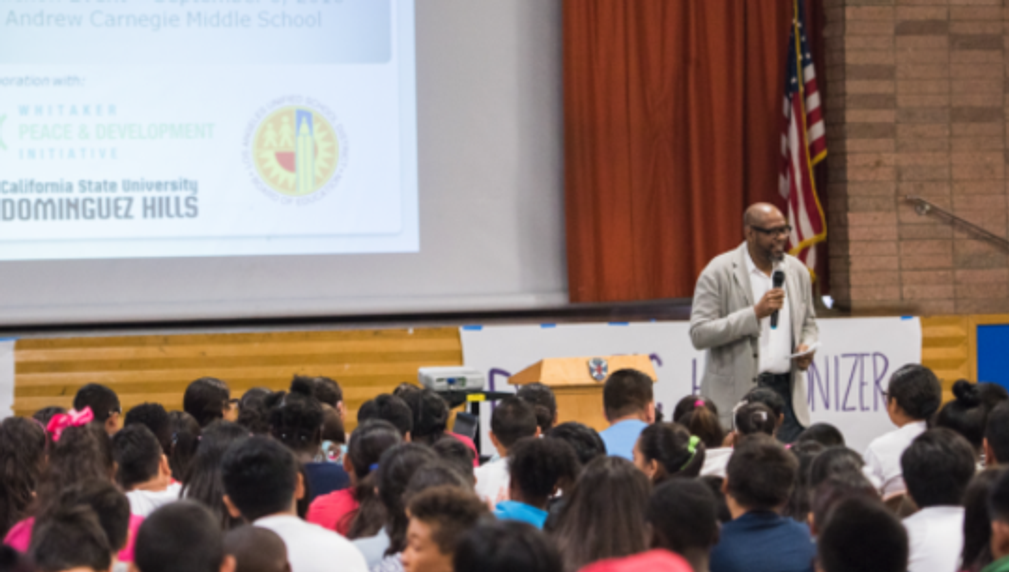Domestic Harmonizer Program: resolving conflict, one middle school at a time
The Domestic Harmonizer Program addresses youth violence, bullying, and conflict, and helps students transform conflicts from negative experiences to opportunities for positive change.

Are any other organizations collaborating on this proposal?
- California State University, Dominguez Hills (CSUDH), - Andrew Carnegie Middle School, - Los Angeles Unified School District (LAUSD)
Please describe your project proposal.
In a community such as Carson, and school district that has seen violence, bullying, and behavioral issues among students, the Domestic Harmonizer Program is boosting both learning, and promoting the prevention and peaceful resolution of conflicts on campus between and among students. Students and teachers at Andrew Carnegie Middle School are learning tools, skills and processes to prevent and resolve conflicts, and to enhance youth leadership and academics.
Which of the LEARN metrics will your proposal impact?
Proficiency in English and Language Arts and Math
Students’ perceived sense of safety at and on the way to school
Suspension and expulsion rates
Truancy rates in elementary and middle schools
In what areas of Los Angeles will you be directly working?
Gateway Cities
LAUSD
Describe in greater detail how your proposal will make LA the best place to LEARN?
Los Angeles is already at the forefront of a number of social initiatives, and our Domestic Harmonizer Program is another example of our city’s immense potential to innovate. At the Whitaker Peace & Development Initiative (WPDI), we believe that education has the power to address some of the most salient issues facing our youth, such as bullying, violence, and high suspension rates. We are convinced based on our experience that conflict resolution skills should be a part of the school curriculum just like any other subject area because conflict is a life-long issue that we all face no matter who we are. However, conflict resolution skills are not innate – we must learn and practice these skills in our classrooms, and the sooner these skills are learned, the better we can create safe and productive learning environments in school, and provide our children with lifelong tools to constructively address conflict. The purpose of our program is to create campus- and classroom-based assets, which will strengthen and focus the resilience of students onto healthy living and making positive transitions to adulthood.
Our Domestic Harmonizer Program is a trailblazing program that addresses these issues. With our program partners, California State University, Dominguez Hills (CSUDH) and Andrew Carnegie Middle School in Carson (which is a LAUSD school), we have launched a truly unique curriculum that integrates Conflict Resolution Education (CRE) with the California Common Core subjects of math, science, social studies and English. Students in the entire middle school will participate in this program beginning the 2016 academic year through the end of the 2019 academic year. At the end of the program, students have an opportunity to create their own social justice projects on their middle school campus.
Our pilot project officially launched at Andrew Carnegie Middle School in August 2016, and will continue until the end of the 2019 academic year. The program will impact the entire school (900+ students, 50+ educators) each year for the next three years.
Please explain how you will define and measure success for your project.
There will be an independent evaluation of the program using qualitative and quantitative measures.
The primary data collection methods and procedures include:
- Surveys (a pre-test administered at the beginning of the year followed by a post-test administered at the end of the year)
- Interview administered questionnaires
- Open-ended interviews
- Focus group discussions
- Classroom observations
Secondary data collection methods and procedures include:
- Analysis of data collected from documents, reports, and records made available to CSUDH and WPDI such as attendance records, graduation rates, overall schools, administration data
- Case studies conducted by teachers at the school of select youth. Each teacher implementing the curriculum will select two students to specifically observe over the course of the year, noting any changes or important interactions that were spurred by the curriculum. These case study notes will be short observational reports done at five times over the course of the year for each student. The students’ names will not be provided and this will be anonymous data collection.
How can the LA2050 community and other stakeholders help your proposal succeed?
Money
Publicity/awareness
Technical infrastructure (computers etc.)
Community outreach
Network/relationship support